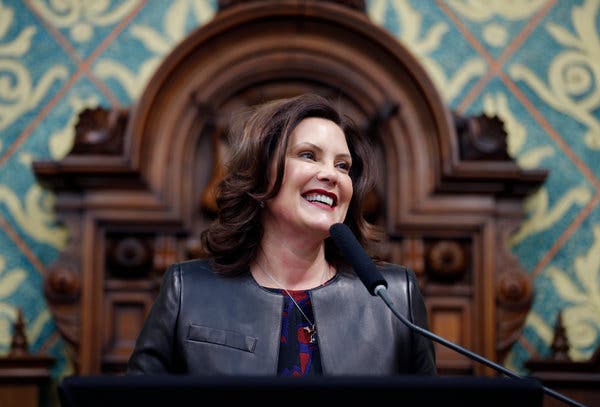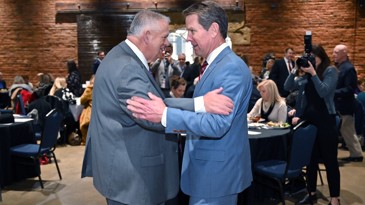Advertisement
Ms. Whitmer won in a state the president carried by focusing on roads, schools and political pragmatism. She will face a national audience in her response to the State of the Union.

[What to expect at Trump’s 2020 State of the Union Address.]
LANSING, Mich. — Gretchen Whitmer has only been Michigan’s governor for 13 months. She has yet to “fix the damn roads,” as she repeatedly promised on the campaign trail. Beyond her state’s borders, she is largely unknown.
But Ms. Whitmer, who on Tuesday will give the Democratic response to the State of the Union, has something her party covets: proof that Democrats can still win in the Midwest. And those swing-state credentials help explain why Speaker Nancy Pelosi called to offer her a national audience. “She’s fresh, she’s smart, she’s witty, she’s bold — and she comes from a state that the Democrats need,” said Kym Worthy, a Democrat who is the elected prosecutor in Wayne County, which includes Detroit.
That Democratic leaders in Congress looked beyond their chambers to select Ms. Whitmer for the speech underscores Michigan’s potentially decisive role in this year’s presidential race. Just four years ago, Democrats were confident they would win the state, and many of them dismissed Donald J. Trump’s frequent campaign visits as quixotic. But after Mr. Trump took the White House by narrowly carrying Michigan, along with Wisconsin and Pennsylvania, a Democratic reckoning ensued.
The party’s answer to that reckoning was Ms. Whitmer, an ex-prosecutor and longtime state lawmaker who won the governor’s office in 2018 by 10 percentage points. Her victory ended full Republican control of Michigan’s capital and lifted Democrats’ hopes of reclaiming the state — and with it the presidency — in 2020.
“People see that all roads to the White House go through Michigan,” Ms. Whitmer, 48, said last week at her office across the street from the white dome of the State Capitol, where she had started to work on a draft of her speech. “The message coming out of Michigan is important.”
In ideology and public disposition, Ms. Whitmer is the president’s opposite. She is a traditional Democratic politician who spent years rising through her party’s ranks. She supports abortion rights, stricter gun laws and other liberal policies. But she speaks about compromise and bipartisanship, and sometimes sounds more like a political moderate.
By putting that contrast on national display, Democratic leaders hope to elevate Michigan, where both parties have already mobilized for November, as well as a particular vision for how they want to win back the industrial Midwest. As a candidate, Ms. Whitmer emphasized issues with cross-party appeal like road repair and health care, and carried a mix of rural, suburban and urban counties that Mr. Trump also won.
“One of the lessons, I think, from 2016 was that you really have to show up,” Ms. Whitmer said. “When you do that, you can’t really get distracted by things that aren’t really front-and-center for voters.”
Ms. Whitmer — whose speeches often fuse folksy humor with biting criticism — takes a national stage with a mixed record from her first year as governor. She worked with Republicans, who control the State Legislature, to lower Michigan’s high auto insurance rates and to allow judges to sentence 17-year-olds as juveniles, not adults. She also received national attention as the first governor to announce executive action to ban the sale of flavored vaping products.
But Ms. Whitmer angered Republicans by issuing nearly 150 line-item vetoes to the state budget and alienated some Democrats by pushing for the closure of the only public high school in Benton Harbor, a majority-black city whose residents eventually convinced her to reverse course.
On her signature issue — filling the state’s lunar-looking potholes and repaving its threadbare highways — the governor has failed to broker a compromise. After Republicans rejected her idea for a 45-cent-per-gallon gas tax increase to fix the roads, Ms. Whitmer announced unilateral action last week to finance construction with bonds.
“This is a temporary solution to take credit for orange barrels,” said Lee Chatfield, the Republican speaker of the Michigan House of Representatives. Mr. Chatfield said that he considered Ms. Whitmer a friend and met with her regularly, but that “I do wish she’d be less partisan.”
As a state legislator, Ms. Whitmer emerged as a voice for women’s rights, publicly describing her own experience of sexual assault years before the #MeToo movement. She also gained prominence as an early supporter of gay marriage and a frequent, sometimes fiery, critic of Republican policies.
But she ran to the right of her two closest challengers in the Democratic primary for governor, and has positioned herself as a more moderate-sounding figure. Ms. Whitmer, whose name has been floated as a possible vice-presidential nominee, insisted in an interview that she remained a progressive Democrat, not a moderate.
“I’d say she certainly has matured in her political style since she was in the Legislature,” said John Sellek, a Republican strategist in Lansing, the state capital. “Her style as governor has been to be forceful, but to portray optimism.”
Members of both parties in Michigan described Ms. Whitmer as a talented, personable politician who is well-versed in policy and formidable behind a lectern.
“She can actually address things in a way that people can comprehend it,” said Mayor Sheldon Neeley of Flint, a Democrat who said the governor was skilled in speaking to voters who had lost faith in government. “She can reach and she can touch and she can articulate a message for those individuals to be able to re-engage.”
But where liberals described a leader tough enough to not back down to Republican demands, conservatives complained about an unwilling negotiator whose actions as governor have veered to the left of her campaign rhetoric.
“Governor Whitmer ran as a moderate who would fix the roads and build bridges,” said Tori Sachs, a former aide to Ms. Whitmer’s Republican predecessor who is now the executive director of Michigan Rising Action, a conservative advocacy group. But so far, Ms. Sachs said, Ms. Whitmer’s tenure has been defined by failure on the road issue and budget vetoes that she said displayed a level of “political vindictiveness” unfamiliar in Lansing.
Ms. Whitmer’s roughly 10-minute rebuttal to the president, an annual proving ground for up-and-coming politicians, carries both potential pitfalls and the opportunity to elevate her national profile.
Though members of Congress frequently give the responses — including Representative Veronica Escobar, Democrat of Texas, who will give a Spanish-language rebuttal to the president on Tuesday — both parties have at times tapped state-level politicians for the task.
Nikki Haley, then the governor of South Carolina, gave the Republican response to President Barack Obama’s speech in 2016, a year before she became Mr. Trump’s ambassador to the United Nations. Kathleen Sebelius, who once gave the Democratic response to President George W. Bush when she was governor of Kansas, was later named to Mr. Obama’s cabinet. And Stacey Abrams, a former Georgia state legislator who narrowly lost the 2018 race for governor, gave the Democratic response last year.
But missteps in the speech can become a punchline for years, as Senator Marco Rubio of Florida learned when he reached for a sip of water during his 2013 response. And Ms. Whitmer’s speech comes at an especially fraught time, with an election looming, an impeachment trial fresh in mind and a president known for riffing. Ms. Whitmer said she was still considering having different pieces of material prepared for her speech, with the option of adding or subtracting based on what Mr. Trump says.
“Depending on what’s going on in the Senate, I can envision lots of different wild scenarios,” Ms. Whitmer said last week. “And I think it would be a mistake to just give a prewritten speech and not acknowledge some of it. So I think we have to be nimble.”
-
-
- Iowa Democratic officials say a delay in results is largely because of a “quality control” effort. When results become available, we’ll post them.
-
- Learn more about the top-polling Democratic presidential contenders.
-

